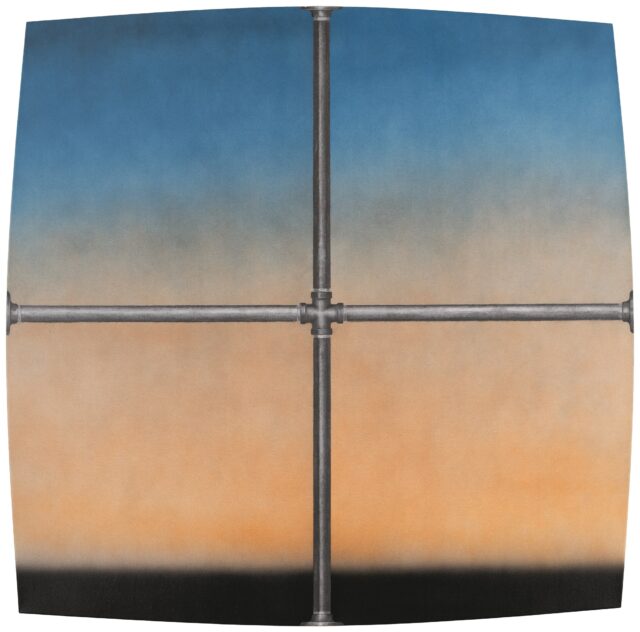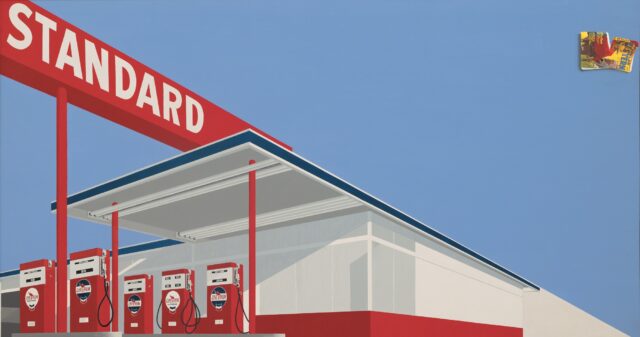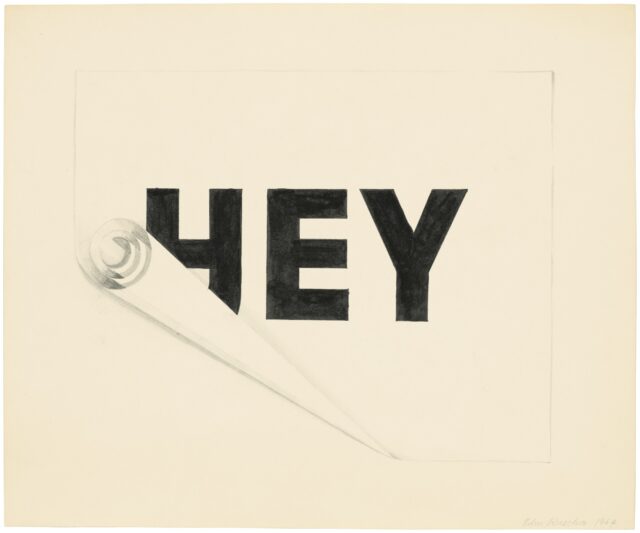
Ed Ruscha, Charles Atlas Landscape, acrylic, pencil, and ink on canvas, 2003 (collection of the artist / © 2023 Ed Ruscha / photo by Paul Ruscha)
ED RUSCHA / NOW THEN
MoMA, the Steven and Alexandra Cohen Center for Special Exhibitions, sixth floor
11 West Fifty-Third St. between Fifth & Sixth Aves.
Through January 13, $15-$28
www.moma.org
“I Dont Want No Retro Spective,” Omaha-born artist Ed Ruscha wrote in a pastel-on-paper work in 1979. Oof — well, he’s got one heckuva retrospective continuing at MoMA through January 13.
There are many joys to be experienced in MoMA’s revelatory “Ed Ruscha / Now Then,” the most comprehensive survey of his seven-decade career, featuring more than two hundred works, including painting, drawing, photography, printmaking, artist’s books, and installation. As eye-opening as the show is, what lifts it to another level for me is the audioguide, in which Ruscha, a longtime LA resident who turned eighty-six earlier this month, offers his personal perspective on thirteen of the pieces.
Talking about the 1962–63 OOF, a large canvas with the title word painted in a sans-serif yellow on a blue background, Ruscha explains, “My first paintings were of words that were monosyllabic, guttural utterings, like ‘oof’ and ‘smash.’ Words that had some kind of vocal power to them and also had a social discord. These words came out of sound investigation. It’s almost like you walk into a butcher store and ask for a pound of bacon and they take a pound of bacon and slam it down on the counter. It’s the slam that I was after.” His good friend, architect Frank Gehry, adds, “He’s very interested in the mundane and the stupid. A painting that says ‘OOF?’ It says everything about the place and time he was living in.”
“Ed Ruscha / Now Then” is filled with such slams, and not only in his word-based paintings, such as Boss, Won’t, and Honk, and such branding and product re-creations as Actual Size, a depiction of a can of Spam, and Annie, the logo for the comic strip Little Orphan Annie. Ruscha, who spent a lot of time on Route 66 and other highways, particularly in Oklahoma, Texas, and California, captures the heart and soul of America in such striking works as The Back of Hollywood (the other side of the Hollywood sign), Large Trademark with Eight Spotlights (the 20th Century Fox logo), and Standard Station, Amarillo, Texas, a spectacularly angled gas station in bold red, white, black, blue, and yellow).

Ed Ruscha, Standard Station, Ten-Cent Western Being Torn in Half, oil on canvas, 1964 (private Collection / © 2023 Edward Ruscha / photo by Evie Marie Bishop, courtesy of the Modern Art Museum of Fort Worth)
Discussing the nearly six-feet-high 1963 oil-and-wax Noise, Pencil, Broken Pencil, Cheap Western, in which the word “Noise” is tucked into the upper right corner, Ruscha says, “The word ‘Noise’ and all words to me, they have really no size at all. You can see it a hundred feet high, you can see it in four-point type.”
In Los Angeles County Museum of Art on Fire (1965–68), flames are shooting out one side of LACMA. Ruscha notes, “About this time that I was painting this picture, I had some, oh, maybe personal gripes about the art world in general. And I felt like the museums were not really doing their jobs as far as opening their doors to contemporary art. I didn’t have a hatred for museums, but maybe, like, I had a healthy distrust for museums. And so I guess part of this painting grew out of that. I didn’t know how this painting would be perceived. The museum actually had a notion to possibly buy that painting, which really surprised me, and then didn’t surprise me so much when they didn’t.” The exhibit moves to LACMA in April 2024.
And Ruscha says about 2022’s Metro, Petro, Neuro, Psycho, in which the four title words are shown above one another in decreasing size against a background of tall grass, “And finally, it comes down to selecting things that sometimes lead you down strange roads, sometimes they’re nonsequiturs, sometimes they’re odd word combinations. But they have to have some sort of power or some strangeness to them for me to get on board.”

Ed Ruscha, Hey with Curled Edge, ink and powdered graphite on paper, 1964 (Museum of Modern Art, New York / Gift of the artist / © 2023 Edward Ruscha / photo by Robert Gerhardt)
It’s easy to get on board with Ruscha’s dazzling output; other highlights are his gunpowder drawings; Spread, a two-sided work made with tobacco stain; Our Flag, an acrylic painting of a disintegrating Old Glory; Evil, in which Ruscha used his own blood on satin; a trio of exceptional graphite and pencil drawings of LA residences; a series of canvases in which Ruscha replaces words with empty spaces or redaction, taking away people’s voices; and books such as Every Building on the Sunset Strip, Twentysix Gasoline Stations, Edward Ruscha (Ed-werd Rew-shay) Young Artist, and Flipping Kicking Howling Rolling Sitting Standing Climbing Telling.
In 1998, Ruscha told Tracy Bartly, “Seeing things age is a form of beauty.” Time is a constant element in Ruscha’s oeuvre, from changing landscapes to a painting of a segment of a clock, from a canvas that declares, “It’s Only Vanishing Cream” to a portfolio of liquid stains on paper. The walls of Chocolate Room are covered with decaying chocolate on paper, meaning it will look slightly different as the chocolate decays and accumulates bloom. Three large-scale horizontal paintings of LA industrial buildings from 1992 are paired with how Ruscha imagined, in 2003–5, they will look in the future; for example, the gray Blue Collar Trade School becomes the blue, white, and yellow The Old Trade School Building, now resembling a prison or hospital behind barbed wire, as if capitalism has failed.
The exhibit takes its name from a 1973 shellac on moiré rayon piece that melds past, present, and future, saying, “Now Then, as I Was About to Say . . .”
As long as Ruscha keeps talking, the world will continue to listen.
[Mark Rifkin is a Brooklyn-born, Manhattan-based writer and editor; you can follow him on Substack here.]